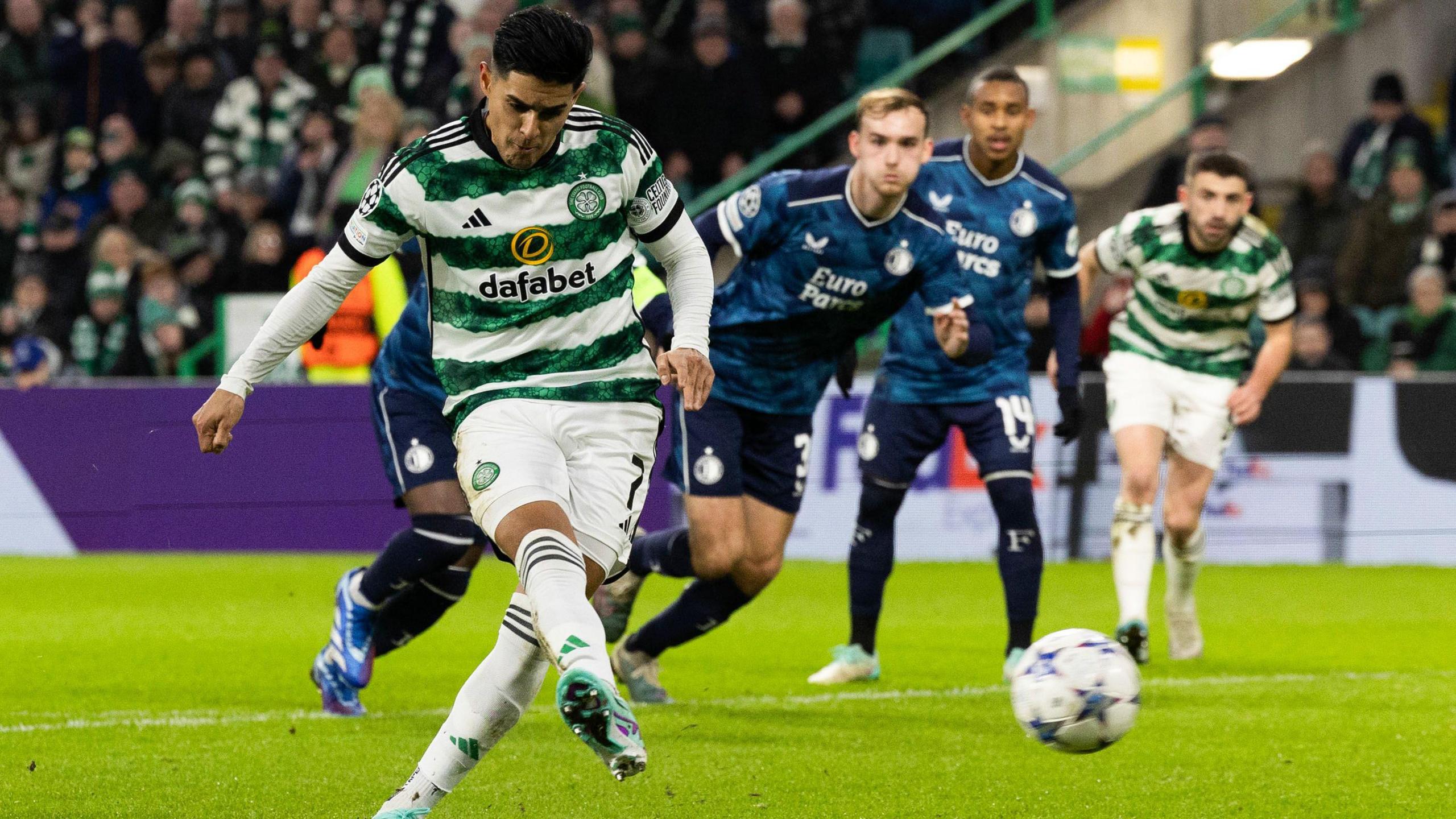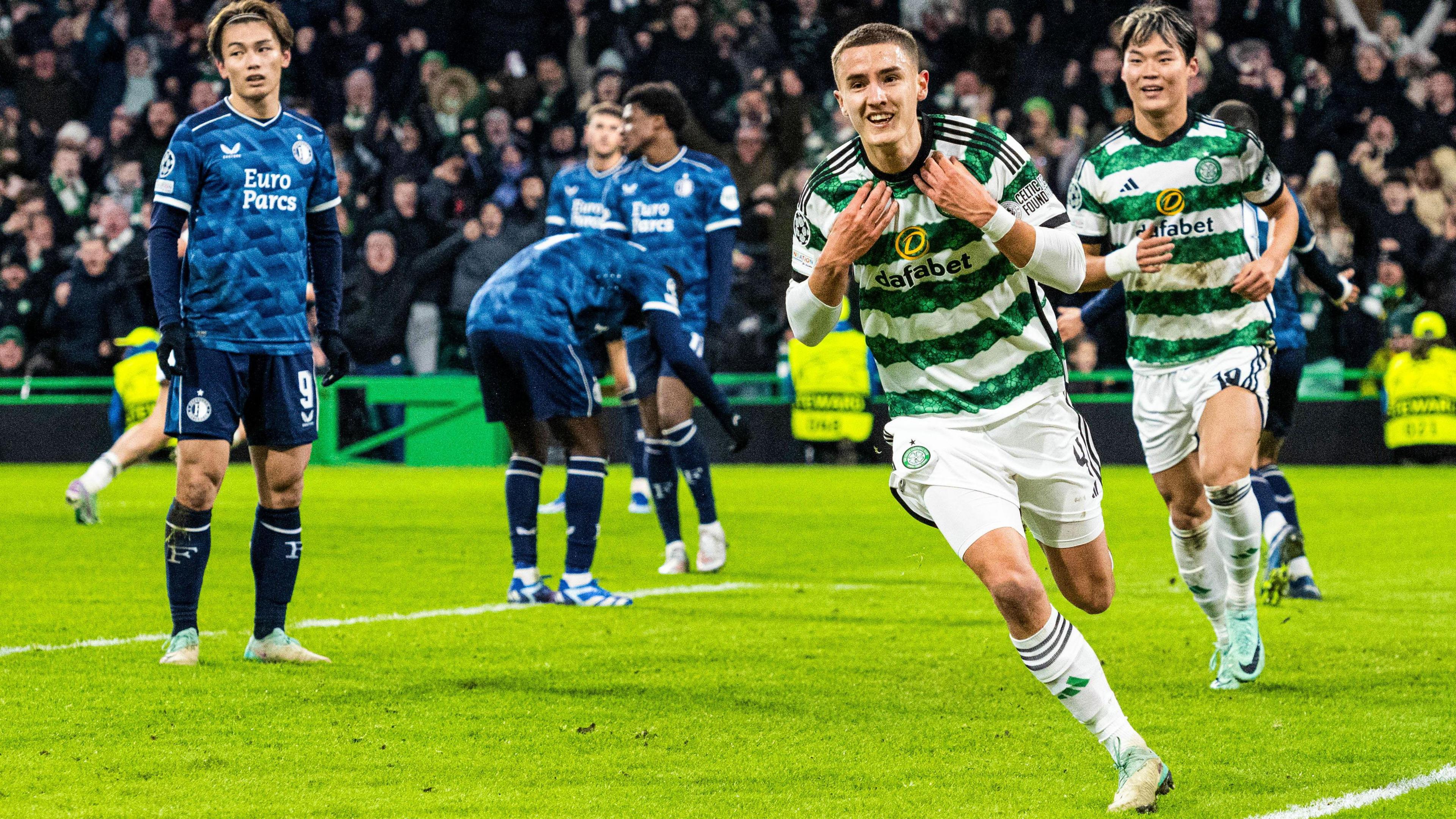What does new-look Champions League have in store for Celtic?

Celtic ended a 10-year wait for a home win in the Champions League last season
- Published
Celtic are preparing for Thursday's Champions League draw and Europe's top-tier event is changing.
It is the first major revamp of the competition since 1992, with the number of games rising significantly from 125 to 189, which means even greater riches.
The group stage is history, with an opening 'league phase' instead.
The draw takes place in Monaco at 17:00 BST and will be covered live on the BBC Sport website, so let's dive in and see what lies ahead for Scotland's sole representatives.
One big 'super group'
We've been used to eight groups of four, with the top two qualifying for the last 16.
Now, it's one table where 36 clubs participate in a league phase, adding four more teams to the mix.
Clubs no longer play three opponents twice, but will take on eight different sides with four home games and four away games.
To determine fixtures, teams are ranked in four seeding pots and each team will then be drawn to play two opponents from each of these pots.
They will play one match against a team from each pot at home, and one away.
Which pot are Celtic in?
POT 1: Real Madrid, Manchester City, Bayern Munich, Paris St-Germain, Liverpool, Inter Milan, Borussia Dortmund, Leipzig, Barcelona
POT 2: Bayer Leverkusen, Atletico Madrid, Atalanta, Juventus, Benfica, Arsenal, Club Bruges, Shakhtar Donetsk, AC Milan
POT 3: Feyenoord, Sporting Lisbon, PSV Eindhoven, Dinamo Zagreb, Salzburg, Lille, Red Star Belgrade, Young Boys, Celtic
POT 4: Slovan Bratislava, Monaco, Sparta Prague, Aston Villa, Bologna, Girona, Stuttgart, Sturm Graz, Brest
How do they decide the fixtures?
Computer says yes.
Technology borrowed from chess tournaments takes over since it has been estimated that a manual draw would require up to 900 balls and would take all day.
One team will be manually drawn from Pot 1 as a ceremonial act at the Grimaldi Forum, then the computer gets to work - thankfully.
- Published18 June 2023
When are the games played?
Each team plays a minimum of eight matches and a maximum of 17, should they reach the final.
In standard weeks, matches will continue on Tuesdays and Wednesdays.
In the Champions League exclusive week - the opening round of games when no other European competitions are played - matches will also be played on Thursday.
The league phase will end at the end of January.
Matchday 1: 17–19 September
Matchday 2: 1/2 October
Matchday 3: 22/23 October
Matchday 4: 5/6 November
Matchday 5: 26/27 November
Matchday 6: 10/11 December
Matchday 7: 21/22 January
Matchday 8: 29 January
What happens if teams are level on points?
Head-to-head is out. The first factor will be goal difference and goals scored.
If that doesn't get the job done, then there's a tally of the points gained by the tied clubs' opponents to determine a difficulty level of the teams faced.
How will the knockout stages work?
The top eight qualify automatically for the last 16.
Those who place ninth to 24th will compete in a two-legged knockout play-off for the chance to progress.
Those 25th or lower will be eliminated - as will the play-off losers. No more dropping into the Europa League.
From the last 16 onwards, the Champions League will continue on its prior path with the final taking place at the Allianz Arena, Munich, on 31 May, 2025.

Celtic's only victory in the Champions League last term was at home to Feyenoord
What are the squad rules?
After the transfer window closes each club must submit two lists.
On 'List A', clubs can submit a maximum of 25 players, with eight places reserved exclusively for "locally trained players", made up of at least four "club-trained" players and a maximum of four "association-trained" players.
Players who meet the "club trained" criteria have to have been on the club's books, irrespective of the player's nationality and age, for at least three years between the ages of 15 and 21.
An "association-trained" player is someone that has played in the same country as the club for three years, irrespective of nationality, between the ages of 15 to 21.
On 'List B', a club can register an unlimited number of players as long as they are born on or after 1 January 2003.
A new signing who has played in any of the European competition qualifying rounds for another club will be eligible for the league phase.
What about Celtic's recent record?
It's not great.
The first British team to lift the European Cup last reached the round of 16 in 2012-13.
In the past two seasons at this level, Celtic have finished bottom of their group, with just one victory.
That 2-1 success against Feyenoord last December was their first Champions League home win in 10 years following frustrating near things against Atletico Madrid and Lazio in Glasgow.
How to follow the Champions League on the BBC
For the next three years, from 22:00 BST on the Wednesday of Champions League matchweeks, there will be match-by-match highlights available on BBC iPlayer and the BBC Sport website and app - plus a highlights show on BBC One at 22:40.
There will also be clips online and on social media, as well as live text commentary of all the games involving British sides on the BBC Sport website.